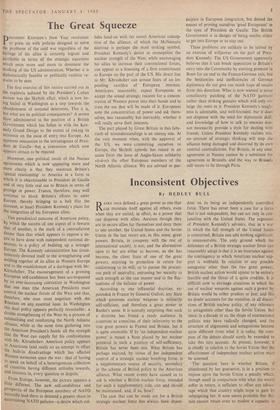The Great Squeeze
PRESIDENT KENNEDY'S New Year resolution to press on with policies designed to solve the problems of the cold war regardless of the feelings of his allies is certainly logical and justifiable in terms of the strategic equations which seem more and more to dominate the thinking of the US administration. Whether it is diplomatically feasible or politically realistic re- mains to be seen.
The first exercise of this nature carried out in the euphoria induced by the President's Cuban success was the Skybolt affair, which is now be- ing hailed in Washington as a step towards the abandonment of national deterrents. This it is, but what are its political consequences? A severe blow administered to the position of a British Government which has fallen in with the Ken- nedy Grand Design to the extent of risking its existence on the issue of entry into Europe. An apparent concession to the intransigence of Presi- dent de Gaulle—but a concession which now appears certain to be rejected.
Moreover, one political result of the Nassau agreements which is now appearing more and more clearly is that they maintain Britain's sPecial relationship' to America in a form in Which it is objectionable to President de Gaulle and of very little real use to Britain in terms of prestige or power. France, therefore, may well continue to block Britain's efforts to enter Europe, thereby bringing to a halt (for the moment, at least) President Kennedy's plans for the integration of his European allies.
This paradoxical outcome of American policy, by which the success of one aspect of it thwarts that of another, is the mark of a contradiction deeper than that which appears to oppose a de- sire to have done with independent national de- terrents to a policy of building up a stronger Europe. The Kennedy administration has simul- taneously devoted itself to the strengthening and welding together of its allies in Western Europe and to the establishment of a duologue with Mr. Khrushchev. The encouragement of a growing European self-confidence has been accompanied by an ever-increasing conviction in Washington that one man (the American President) must control the nuclear forces of the West and that, therefore, one man must negotiate with the. Russians on any essential issue. In Washington this dual policy appears perfectly reasonable: a double strengthening of the West by a process of rationalising and reinforcing the North Atlantic alliance, while at the same time gathering into the American.President's hands all the strength that the West can supply for his confrontation. with Mr. Khrushchev. American policy appears to Americans (and really is) an attempt to offset, the built-in disadvantage which has affected Western statesmen since the war ; that of having to speak on behalf of a heterogeneous collection of countries having different attitudes towards, and interests in every question in dispute.
From Europe, however, the picture appears a little different. The new self-confidence and prosperity of the European members of NATO naturally lead them to demand a greater share in determining NATO policies—a desire which col-
lides head-on with the recent American concep- tion of the alliance, of which the McNamara doctrine is perhaps the most striking symbol. President Kennedy's desire to monopolise the nuclear strength of the West, while encouraging his allies to increase their conventional forces, can appear as a lessening of a firm commitment to Europe on the part of the US. His direct line to Mr. Khrushchev can arouse fears of an im- pending sacrifice of European interests. Americans, reasonably, expect Europeans to accept the sound strategic reasons for a concen- tration of Western power into their hands and to trust the use that will be made of it. Europeans note the concentration of power and ask them- selves, less reasonably but inevitably, whether it will really serve their interests.
The part played by Great Britain in this laby- rinth of misunderstandings is an uneasy one. At the very moment when, with the approval of the US, we were committing ourselves to Europe, the Skybolt episode has raised in an acute form the issue of Anglo-Saxon solidarity vis-à-vis the other European members of the North Atlantic alliance. We are advised to par-
ticipate in European integration, but denied the means of proving ourselves 'good Europeans' in the eyes of President de Gaulle. The British Government is in danger of being unable either to get into Europe or to stay out.
These problems are unlikely to be solved by an exercise of willpower on the part of Presi- dent Kennedy. The US Government apparently believes that it can break opposition to Britain's entry into the Community by exerting pressure in Bonn for an end to the Franco-German axis, but the hesitancies and inefficiencies of German diplomacy do not give too much hope of results from this direction. What is now wanted is some conciliatory patching of the NATO garment rather than striking gestures which will only en- large the rents in it. President Kennedy's tough- ness is admirable, and well-founded, but it does not dispense with the need for diplomatic skill; and knowledge of how to talk to enemies does not necessarily provide a style for dealing with friends. Unless President Kennedy realises this, no amount of strategic thinking will stop the alliance being damaged and distorted by its own internal contradictions. For Britain, in any case; agreement at Nassau cannot be a substitute for agreement at Brussels, and the way to Brussels still seems to lie through Paris.






























 Previous page
Previous page